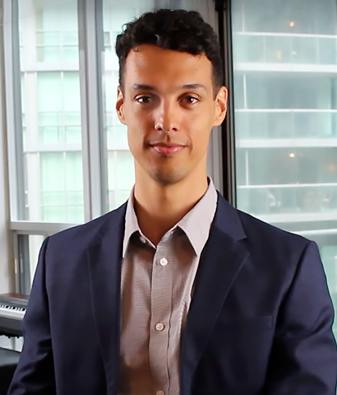Inside a police patrol car, an officer sits in the front seat while a suspect taken into custody sits in the back. The two exchange banter about breaking parole, repeat appearances in court, a judge and so on.
After a pause, the officer says, “How’s the family?” The suspect replies, “They’re doin’ all right. You can stop by anytime, you know.” “Yeah, right. Like anyone would ever talk to me again,” the officer says, revealing unexpectedly that the two have a shared, personal history.
The scene plays out, not in a new crime series on Netflix, but in a 16-minute, animated video created by Alexander Barnett, an assistant professor in the Faculty of Arts & Science’s Department of Psychology, and ably voiced by members of his lab.
Barnett’s research focuses on episodic memory: the memory of our experiences such as a recent family gathering or vacation abroad. In particular, Barnett studies how the brain’s neocortex works in tandem with the hippocampus to form, retrieve and transform episodic memories.

The crime story video and a companion Game of Thrones-style video were produced for a study in which Barnett and his colleagues examined the interaction between the neocortex and hippocampus as subjects watched the stories play out. Barnett and his colleagues then tested the subjects’ recall of what they’d just viewed.
The researchers found that activity between the neocortex and hippocampus was not constant throughout the videos. This was in contrast to the previous understanding that as we watch a movie, enjoy a family gathering or attend a sporting event, the two parts of the brain are working together continuously to create memories.
Instead, the researchers found that activity peaked at the end of sequences, which cognitive scientists refer to as ‘events.’ We naturally segment experiences into discrete events — for example, when the conversation between the officer and culprit takes an unexpected turn and reveals they have a personal relationship, or when the narrative moves from police car to police station, or when a scene begins with a new set of characters.
Barnett tested how well subjects recalled details about what they’d just seen and found that this increased neocortex-hippocampus activity at the end of an event corresponded with better recall of the preceding event. The end of events triggered the release of information from the neocortex to the hippocampus, the first step in creating longer term memories.
In contrast, if the neocortex and hippocampus communicated more at the middle of an event, participants were likely to forget that event on the subsequent memory test. This highlights the importance of the timing of communication.
The paper describing the study, Hippocampal-cortical interactions during event boundaries support retention of complex narrative events, was published in the journal Neuron. Barnett’s co-authors are from the Center for Neuroscience and Department of Psychology at the University of California, Davis.
“Previously, we thought that whatever was happening in short-term memory was constantly being fed to the hippocampus to form longer term memories,” says Barnett. “But our work suggests this is only happening at event boundaries when all this information is sent to the hippocampus.”
In the study, 25 participants viewed the two 16-minute videos while their brain activity was monitored via functional magnetic resonance imaging (fMRI). The researchers then asked participants to recall details about the videos immediately after viewing and two days after.
According to Barnett, this insight into encoding memories at the end of events has potential for helping those with memory impairments.
“In the future, we might be able to enhance the connectivity between the neocortex and the hippocampus of patients at event boundaries, improving their ability to encode memories,” he says.
According to Barnett, electrodes are already implanted in patients’ brains to prevent seizures and perform other neurological tasks. Similar technology and precise timing based on this result, he says, might lead to a therapy to improve a person’s ability to encode memories.
"Like so many people, I have family members who have gone through dementia and suffered memory loss,” says Barnett. “I’ve witnessed what that's like. So, trying to understand how that happens in the brain and how new research might help those with memory impairment has always been something that's excited me.”

